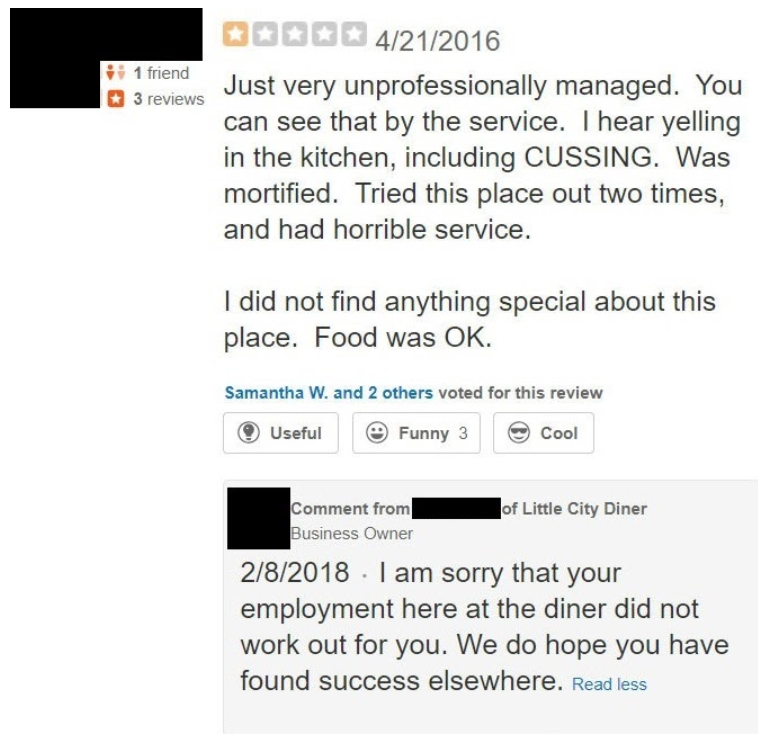How to Respond to Criticism to Improve Your Brand Image

Well over half of the world uses the internet regularly, and when customers feel a business has wronged them, it is easy for them to go online and vent. As part of the gaming industry, it is likely that the vast majority of your audience spends their time online and occasionally leaves a bad review. 88 percent of global consumers consult reviews when looking for a business (source: Podium), so it is vital to ensure that your players positively review your game.
However, this won’t always be the case, and you’ll get negative reviews occasionally. How you respond to this will affect how people perceive your game, and in this blog post, we share helpful ways to react to negative feedback to boost your image.
Why is responding to feedback important?
A study by Accenture found that 52 percent of customers changed providers because of poor customer service. Your gaming business cannot give up players like some companies, so you must give them a good experience.
Responding to feedback helpfully is one way of providing excellent customer service. Other than solving a specific problem, you show gamers you value their time (and money).
We’ll show you how to respond appropriately to online criticism, but let’s look at its different forms before we do that.
Bad reviews
Bad reviews are commonly published by legitimate customers unsatisfied with a company’s service. They express their frustration about issues they have experienced with a product, customer support, or something else. For businesses, they might not be accurate in explaining what happened, but for new customers, they paint a picture that they’d rather not be involved with.
Trolling
Trolls are inflammatory and off-topic comments made to get you to respond negatively. They are meant to harm your reputation, so you must be careful about how you react. This is very common in gaming, and you’ve likely heard of this occurring in multiplayer games and forums. Our recommendation? Don’t take comments like these to heart. If you can’t spin it in a funny way that reflects positively on your brand, delete them or leave them be.
Threats
Threats are statements made to show an intent to inflict pain or damage. These statements have no real value to your business.
Before responding to any of these forms of criticism, you need to ask yourself these three questions to help you decide on the most appropriate action.
- Is this valid criticism?
If it isn’t, then don’t waste your time giving a response. Use your time for other productive things. If the criticism is valid, admit your mistake and work to get the issue rectified.
- Do they want to get a negative response out of me?
Trolls just want you to respond to their attacks. Ignore them and move on.
- How do I de-escalate the situation?
As a brand, you need to take control of the situation and give helpful and genuine feedback. Don’t give negative responses or take a defensive stance. Make sure the client feels listened to and apologize for any inconvenience caused.

How to respond to criticism
Now that you know the different forms of online criticism, let’s take a look at the best strategies to respond to criticism to help you maintain a positive brand image online.
View it as an opportunity to show your brand’s helpfulness and responsiveness by offering a solution
Game marketing experts recommend this response when your brand could have done better to enhance the user experience. Acknowledge any wrongdoing if you exercised poor judgment or made an error. Make no excuses.
If you are in a position to solve the customer’s problem, do it immediately to their satisfaction. If it will take time to deal with the issue, let them know in advance and get back to them when you sort things out. This strategy shows that you are responsive to your gamer’s needs and will help you avoid deterring any new players.

Respond to the good things they have to say about your brand/service/product and then respond to the criticism
If a user complaint includes positive and negative feedback about your game, then you have the ideal response format. As the title suggests, first note positive comments, thank them for what they said and then move on to any negative points they had. With this tactic, you can reinforce your game’s USP and solve their issue.
Most client complaints are posted on public forums, and starting your response positively allows you to remind other users that your game is still an excellent choice. But many companies forget that their response to online criticism can carry more weight with other potential buyers than the original poster. That is why you need to use every opportunity to share your brand’s positive aspects and show that it is authentic and focused on the needs of its audience.
Don’t forget to solve the original poster’s problem to prevent the situation from escalating further and show that you’re ready to help.

Respond humorously
Humor is another great tool that you can use to respond to online criticism. Note that humor will depend on the type of brand you run, and it won’t be suited to most if it doesn’t meet your brand image. But, as a game developer, there’s usually an element of fun you can use here and there.
Humor is a fantastic way to diffuse a tense situation if the complaint isn’t overly severe and your brand identity allows it. People are generally online to have a good time, and most, especially the young generation, will identify with your humorous responses.
However, you should ensure not to make fun of the customer when giving your responses to prevent them from becoming targeted by online trolls. Your customers should feel valued, and your answers should leave them with nothing but positive feelings about your brand.
Assess the situation and the poster; if your brand image allows it, make a humorous comment for potential customers to see.

However, this is an example of a humorous comment that did actually poke some fun at the user, and seemed to work in the restaurant’s favor. We do not recommend this tactic unless it works for your brand and you can ensure that it will not backfire for you.
Thank them for their feedback and leave it at that
Apply this strategy when users leave inaccurate or abusive complaints, and you can do nothing to soften the situation. People sometimes use the internet to post false information about people and brands because they can do so without immediate implications.
When your brand becomes a target for these people, thank them for their feedback and move to other things. This shows that you have acknowledged the review, letting others know you are paying attention. Any credit that the bad reviews may have had is immediately swept away, which will help you gain favor with potential clients.

Respond to help future customers
Customers can sometimes be insulting. Sometimes you can do nothing to appease them. If you can’t ignore them, humbly reply to their comments to acknowledge that you’ve received the criticism. Reinforce your company’s truth, but don’t be rude, as you may be playing into their hands. People who make childish comments are doing it for fun, and if you give rude replies, they will engage you in useless arguments that won’t benefit your brand.
Your best bet is to apologize to the customer for any inconvenience you may have caused. As we mentioned before, those who come across the complaint and your response will be impressed by how you handled the situation, and this will help you attract more people to your brand. Your polite response to hurtful comments is an opportunity to show future customers how caring and responsive your brand is. You’re often not technically responding to the original poster but to those who may come across it later.

Ignore or remove the criticism if it is offensive or is spreading false information that would bring harm to others, or is irrelevant to your brand
We don’t recommend deleting feedback, but sometimes if it’s offensive to others, would put someone at risk, or is sharing information unrelated to your brand (i.e., posting suspicious links or copy-pasted messages), this might be the best advice. By now, childish comments want you to lose your temper and bring yourself down to the poster’s level. In this case, overlook the rude comments and move on.
Some users may also spam the comment section of your social media posts. They might leverage your popularity to promote their businesses or post spam links to trap unsuspecting users. Delete these comments to prevent your followers from getting directed to harmful websites. You must keep your social space safe for all, and eliminating harmful and irrelevant comments is a positive step in this direction.

Social media marketing is your key to success!
With the right strategy, social media can make your brand stand out among the masses and help you grow into a leading figure in your industry. Get all the tips you need to know in our ultimate guide here: Your Must-Have Guide for Social Media Marketing!
Responding to negative feedback can be tricky. The criticism could be from genuine customers or bullies; how you respond will affect how other users perceive your brand. You may push potential players away from your game without the right plan.
To prevent this from happening, our gaming marketing agency can help you develop social game marketing strategies that maintain your brand image while making the best move for your game. Game Marketing Genie is experienced in social media management, and we’d be happy to help you build your game’s presence.
Get in touch today for consultations with our marketing experts on how to respond appropriately to the online criticism of your business.



